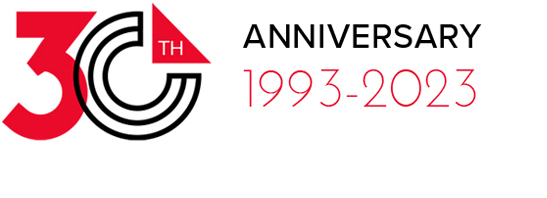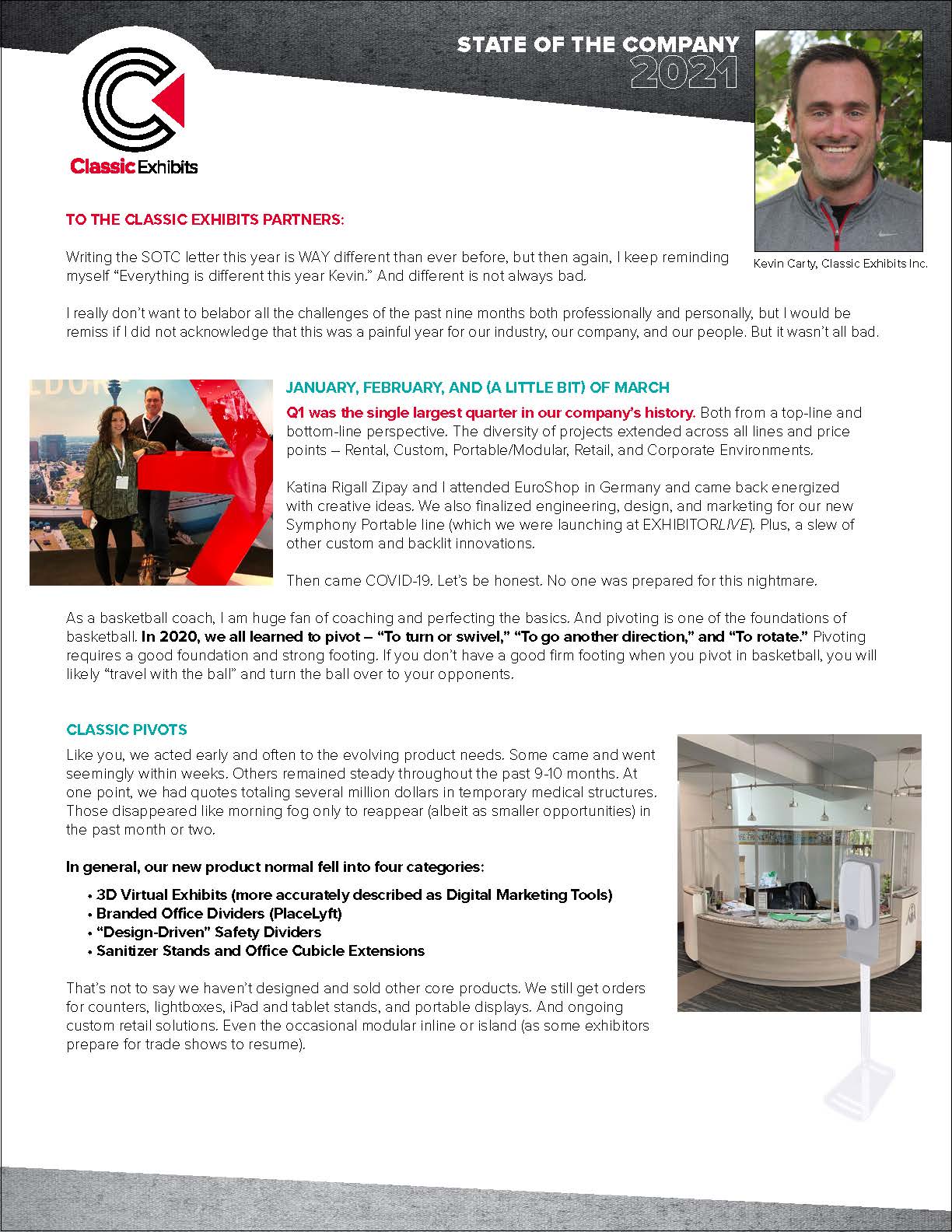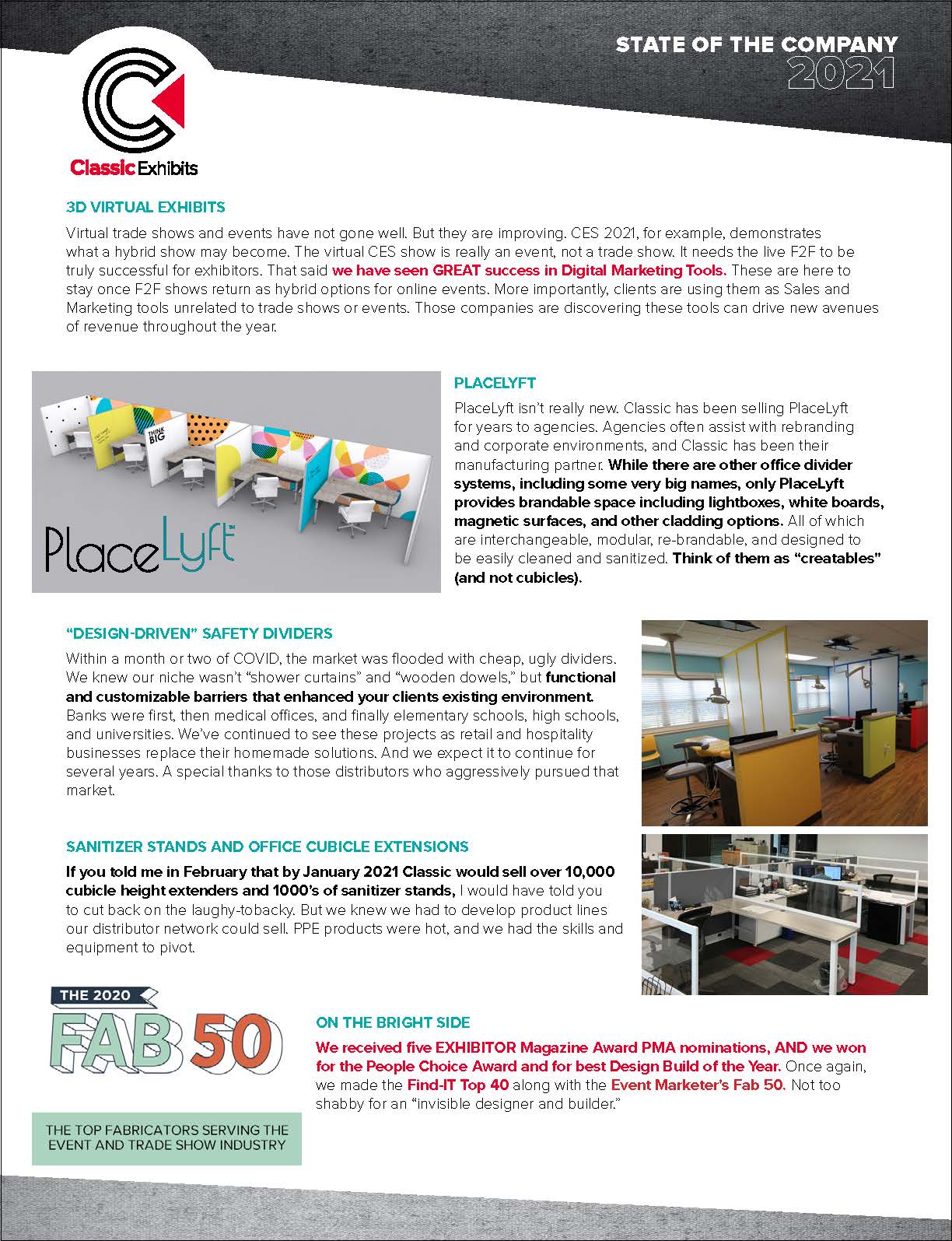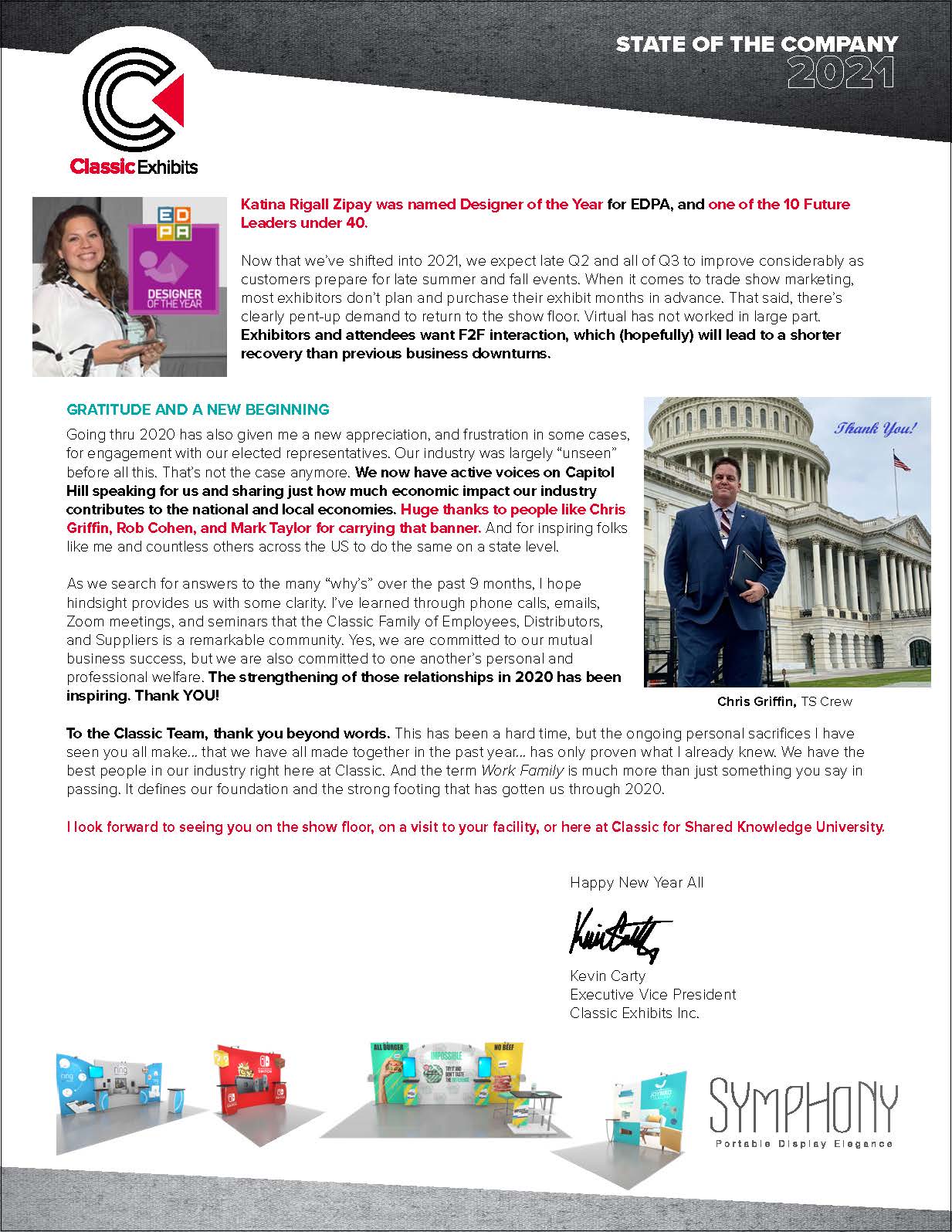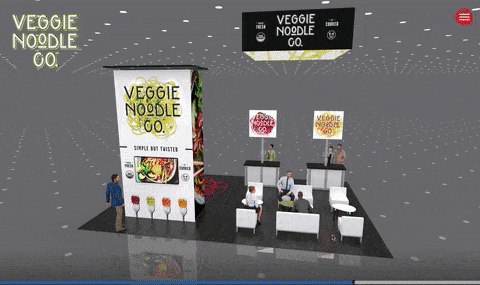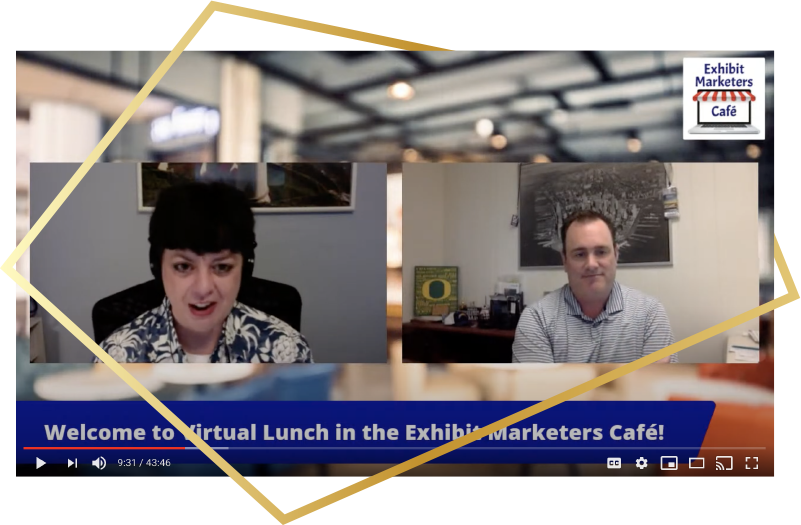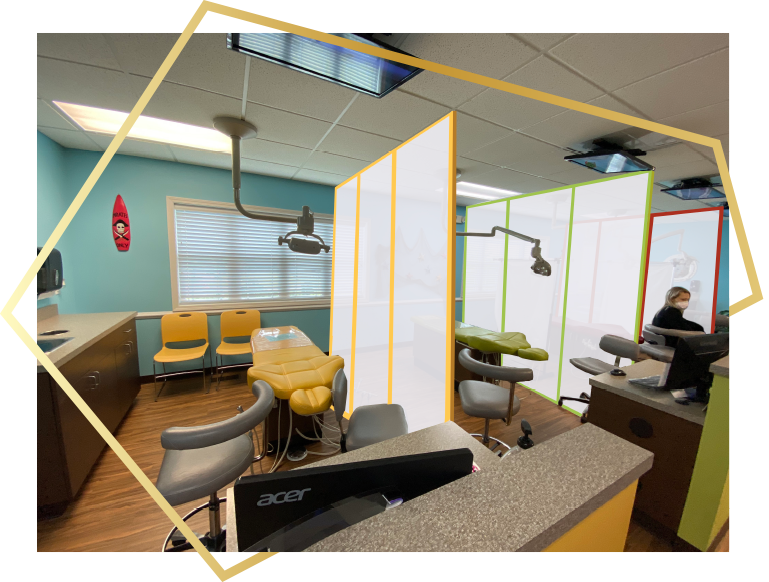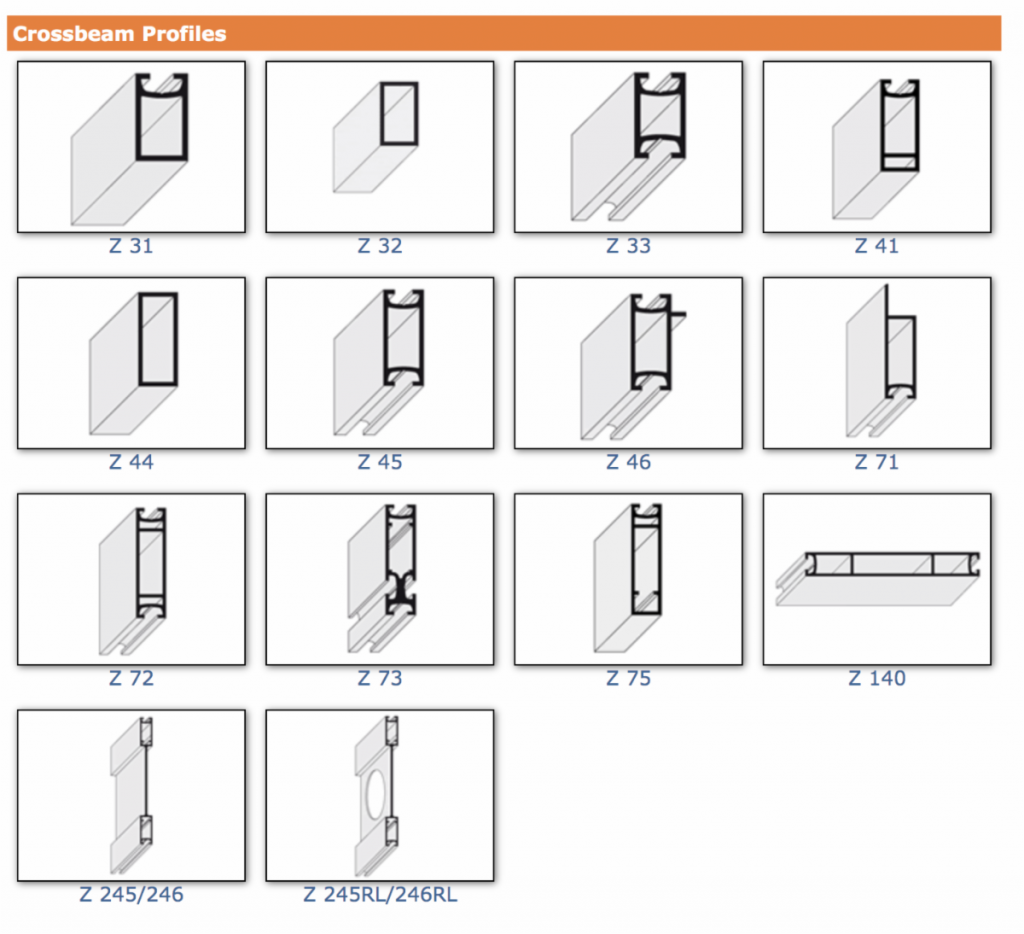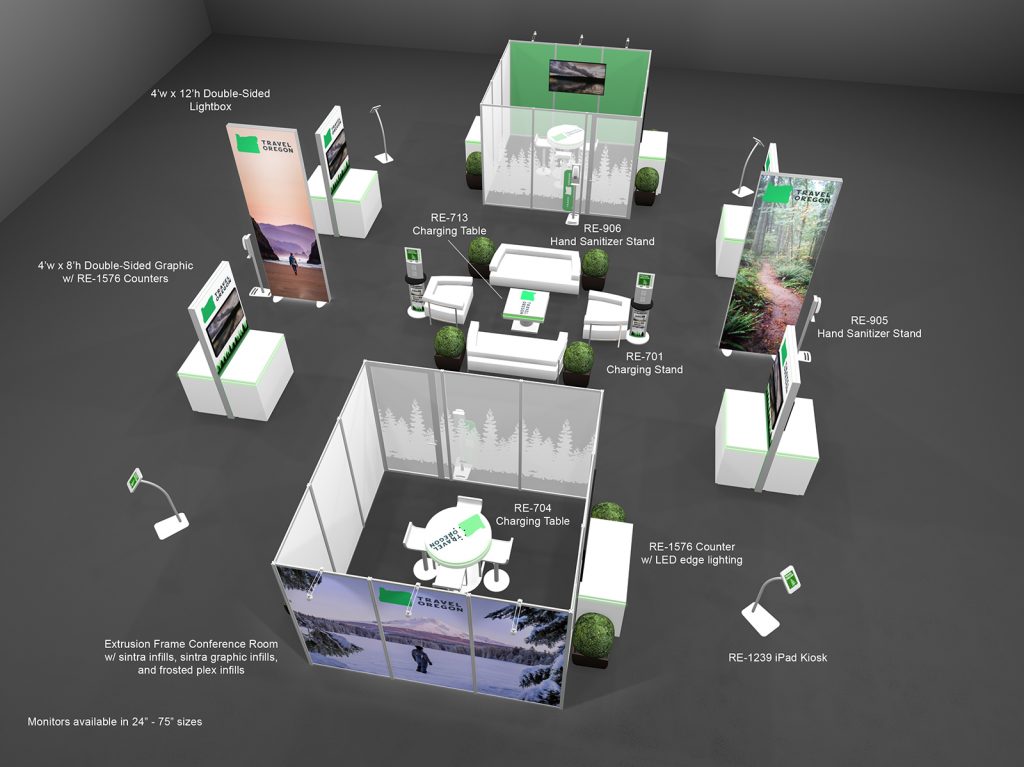
Perhaps no industry has been impacted by COVID more than trade shows and events. Restaurants switched to carry out and deliveries. Hotels and airlines still operated but with fewer customers. Trade shows and events came to a complete halt. This disruption impacted every segment of the trade show/event industry and the sales and marketing plans of tens of thousands of companies that attend or participate in face-to-face marketing.
The return of trade shows and exhibitions has meant new safety and health guidelines, not only for show organizers and convention centers but also for exhibitors. At Classic Exhibits, our 3D exhibit designers have created trade show booth designs that address those safety concerns by implementing greater physical distance, traffic flow patterns, plex barriers, and easy-to-clean surfaces.
6 Modern Trade Show Booth Design Tips for Safety
No one knows precisely what to expect about trade show design guidelines, such as whether show organizers and convention halls will have specific requirements for exhibitors or if standard North American Regulations will be revised. But you don’t need a weatherman to know which way the wind is blowing. Here are some commonsense suggestions.
1. Hand Sanitizer: Let’s start with the easy one. Yes, there will be hand sanitizer solutions both in the exhibit hall and in booths. Regardless of the booth size. However, you still have choices other than sticking an off-the-shelf stand in your booth. Consider how it can be integrated into the overall exhibit flow and graphics. While it needs to be there (and conveniently located), it doesn’t need to be a visual focus.
Tip: Consider jazzing up your sanitizers with custom colors, vinyl graphics, and counter-mounted dispensers.
2. Social Distancing: This topic is complicated. For your exhibit designer, it will affect every decision in your booth. How does the designer position meeting rooms, presentation areas, and demonstration spaces to be both effective and safe? Will the exhibit have seating? If so, how far apart do you need to place the furniture? Some areas may require dividers, such as acrylic partitions. Some exhibitors may decide on a larger space to ensure social distancing. Others may elect to remove items like counters, workstations, and storage.
Tip: Schedule demos and presentations by appointment only. You’ll be able to manage the flow and create a buzz before the show even opens.
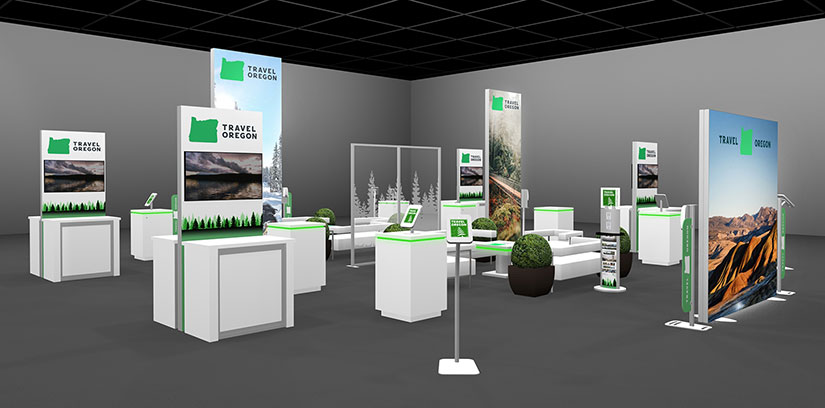
3. Traffic Flow: Even before COVID-19, exhibit designers obsessed about traffic flow and the efficient use of space. Layer on safety and it’s gotten more complicated. Post-COVID exhibit designs may require more area segmentation allowing booth staff to meet with attendees away from other attendees. Think multiple workstations or counters with similar/duplicate information and functionality.
Tip: Consider a designated entrance and exit to your inline and island booth with one-way traffic flow.
4. Storage: We love to touch surfaces, fabric, and screens. That’s not about to change. And for many exhibitors the ability for customers to touch products or navigate through self-guided presentations is critical. However, those items will need to be sanitized throughout the show. Convenient storage of disinfectant sprays and wipes will make that easier and minimize visual clutter in the booth.
Tip: Just as important as cleaning supplies are waste baskets. Discuss with your designer how to integrate them into the look of your booth.
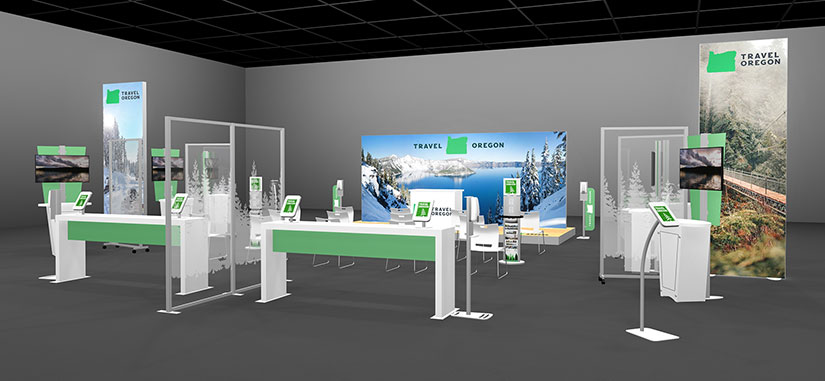
5. Technology: Expect QR codes, scanners, augmented reality, motion sensors, and LED screens to be more common in trade show booths. These technologies limit or eliminate touching a surface and many, like QR codes, allow attendees to use their own devices to gather information. How about printed media such as brochures, product sheets, and catalogs? Those will be exclusively digital, and the smarter exhibitors will have solutions to present and send that information in real-time.
Tip: Most lead retrieval systems are designed to do much more than just capture an attendee’s basic information. You probably already knew that… but may not have tapped into those capabilities in the past.
6. Hybrid Design Solutions: For the first time, exhibitors and designers will need to consider both a physical and a virtual booth. Should they be identical? Not necessarily. It’s much more important that there’s a clear marketing plan that addresses your goals. For most exhibitors, the virtual and physical goals will be the same so the branding, media, presentations, etc. will be identical. However, other exhibitors may decide to present a different message or experience for their virtual attendee vs. physical one.
Tip: Want to save time and money? Treat your Exhibit Designer like a member of your team. The more information they have, the greater the likelihood they’ll hit the mark designing your virtual and physical booths.
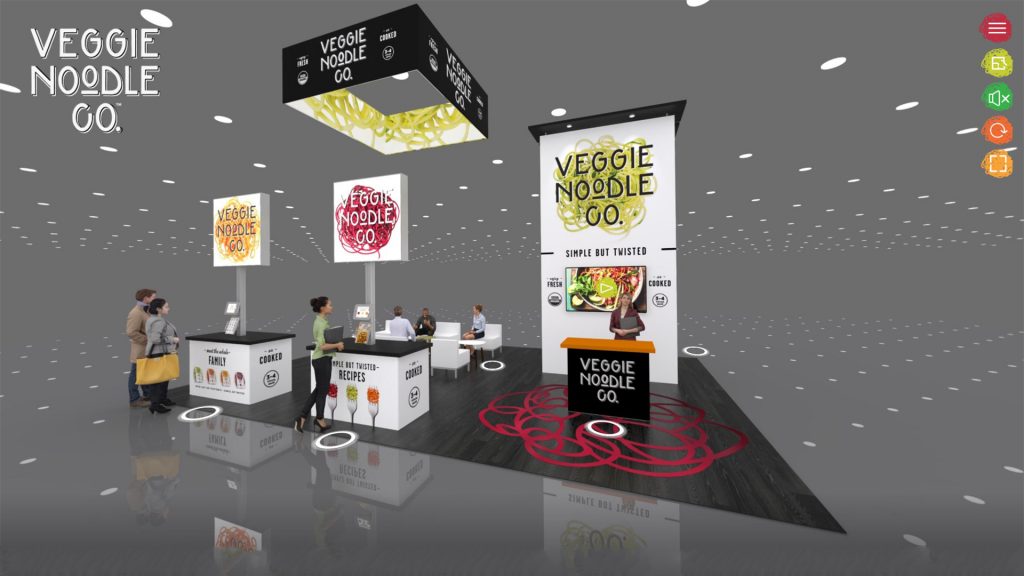
Trade Show Booth Design: COVID-19 Preparedness & Safety Plan
Most large convention centers are now GBAC STAR Accredited. The GBAC STAR Accreditation Program is performance-based and designed to help facilities establish a comprehensive program for healthy spaces. This includes strategies for infection prevention and cleaning for health that promotes wellness for building occupants, visitors, staff, and their community.
The GBAC STAR Accreditation program relies on a 20-element quality management program, which encourages a system based on science. Supporting the use of proper protocols, correct disinfection techniques, and cleaning for health best practices.
An accredited facility has committed to having:
- Established and sustained a cleaning program to enhance occupant health.
- The proper cleaning protocols, disinfection techniques, and work practices to nurture occupant health and meet any biosafety challenges.
- Knowledgeable cleaning professionals who are trained to uphold the highest standards of cleaning and building maintenance.
These facilities often mandate those same protocols for vendors, exhibitors, and attendees. Exhibitors would be wise to consider the GBAC protocols when designing their booth, working with vendors like show labor, and training their staff for the show.
6 Safety-Conscious Booth Display Ideas & Examples
1. Rental Option A. Corporate events or meetings typically don’t have the same space limitations as trade show exhibits. Rental Option A is segmented into three functional spaces: stage/presentation, demos using monitors, and self-service genius bars with iPad tablets.
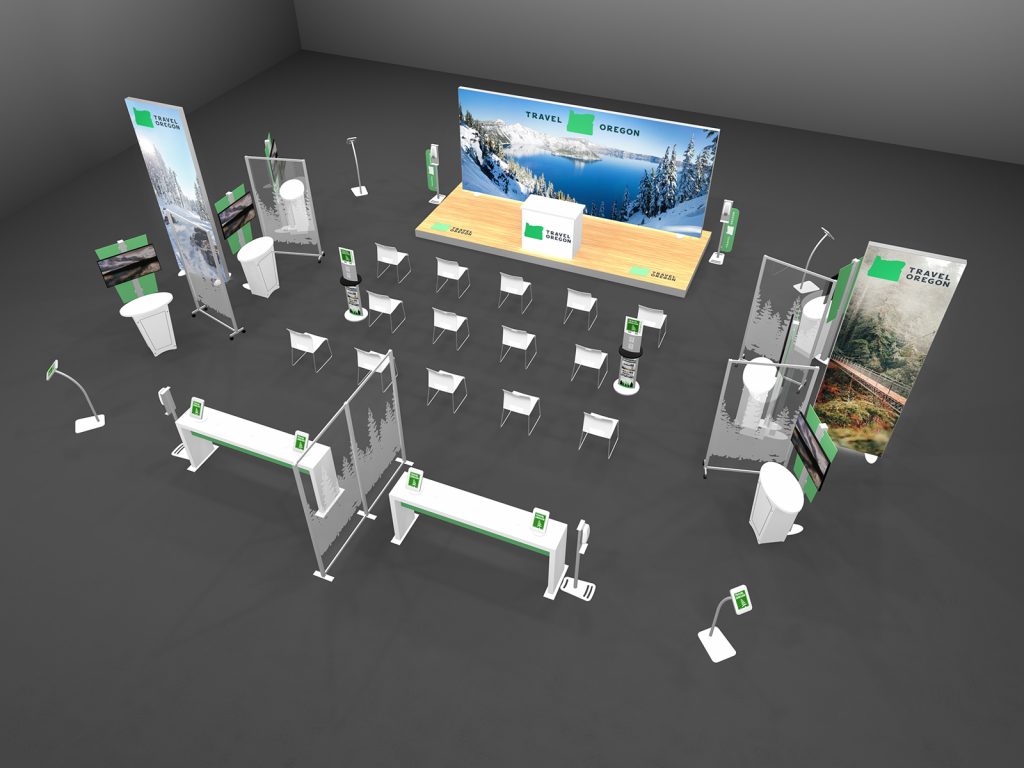
2. Rental Option B. Option B balances seating, demos, branding, and workstations while using the space efficiently. The graphics are large without being intrusive and allow for movement and privacy.
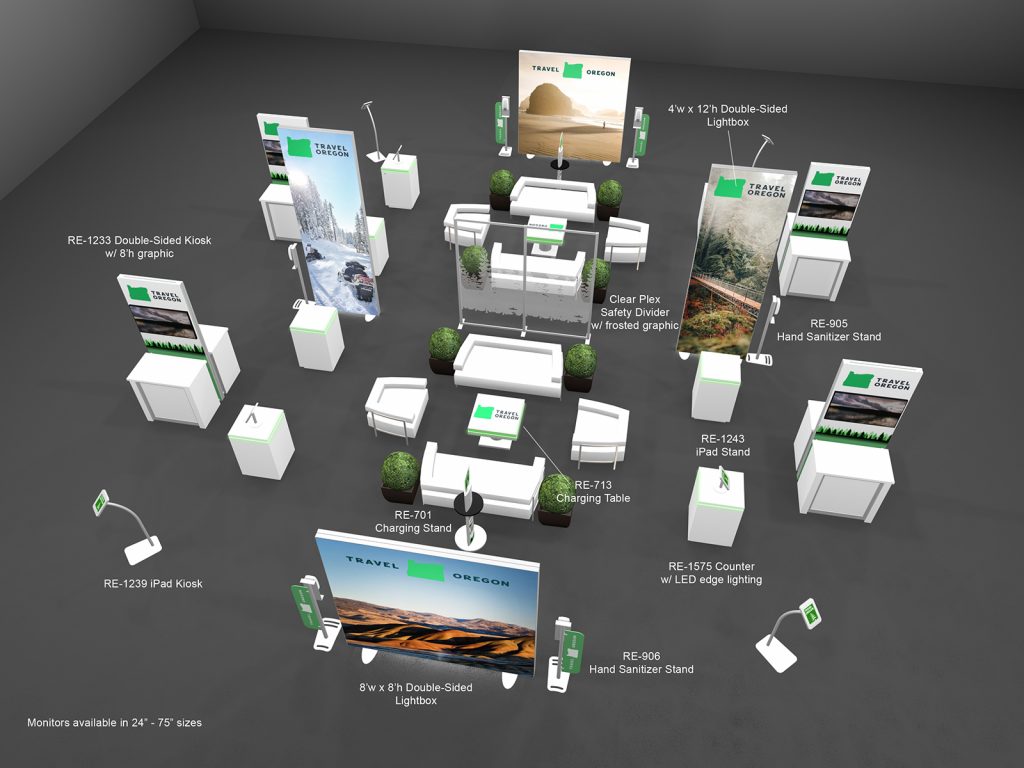
3. Rental Option C. For many companies, private meeting space is essential. Option C includes two large meeting rooms, along with a comfortable central waiting area. There are also (4) double-sided workstations for individual presentations.
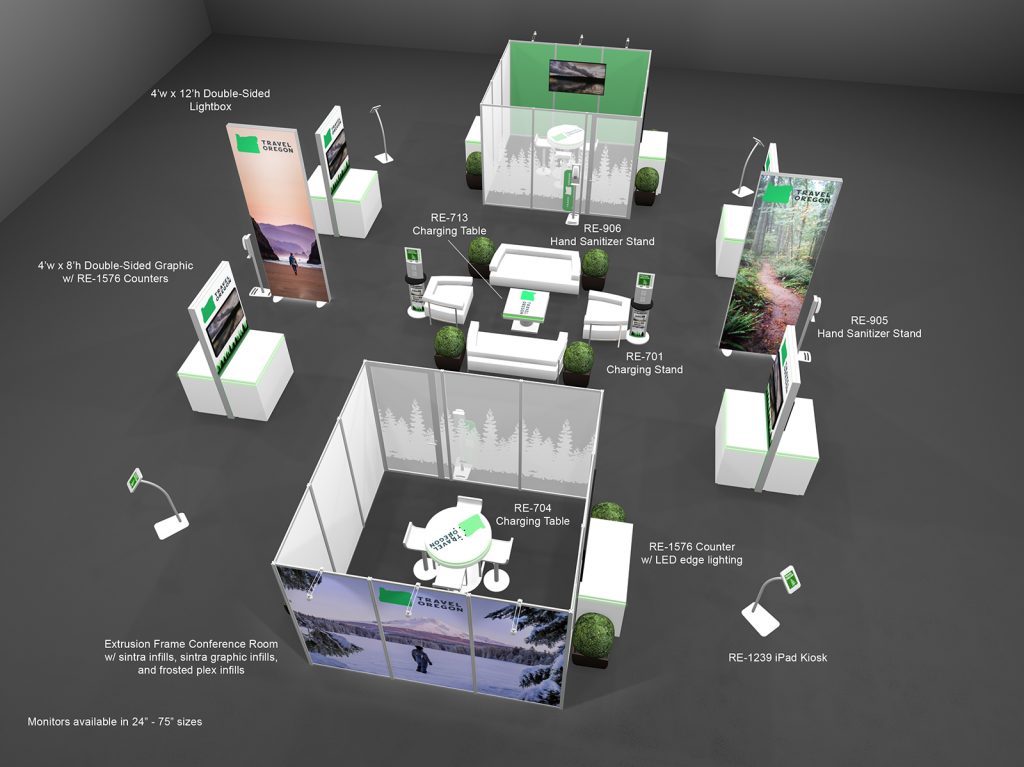
4. MOD-1377 | Sanitizer / iPad Stand. Unlike the previous corporate meeting spaces, trade show exhibitors must maximize their booth. The MOD-1377 combines a hand sanitizer with an iPad stand and literature holders. This 3-in-1 approach makes it ideal for both inlines and islands.
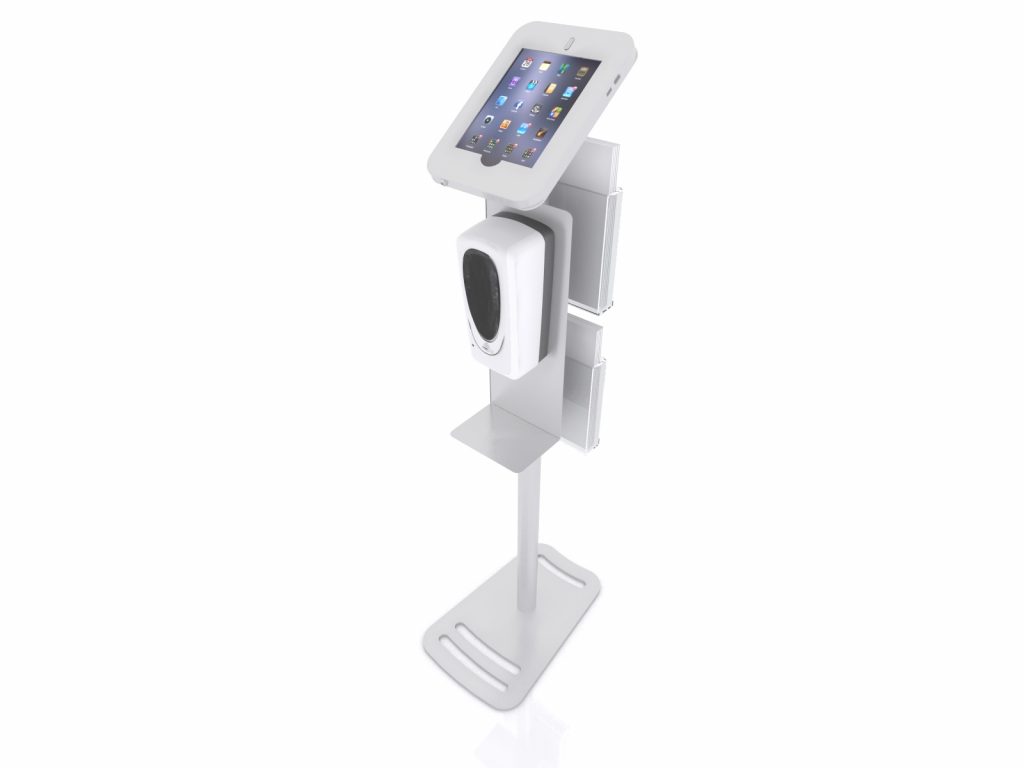
5. MOD-9002 Hand Sanitizer Stand w/ Graphic. A hand sanitizer without branding is like pie with ice cream. It’s OK but it’s so much better with both. The MOD-9002 has a small footprint and switching graphics couldn’t be easier.
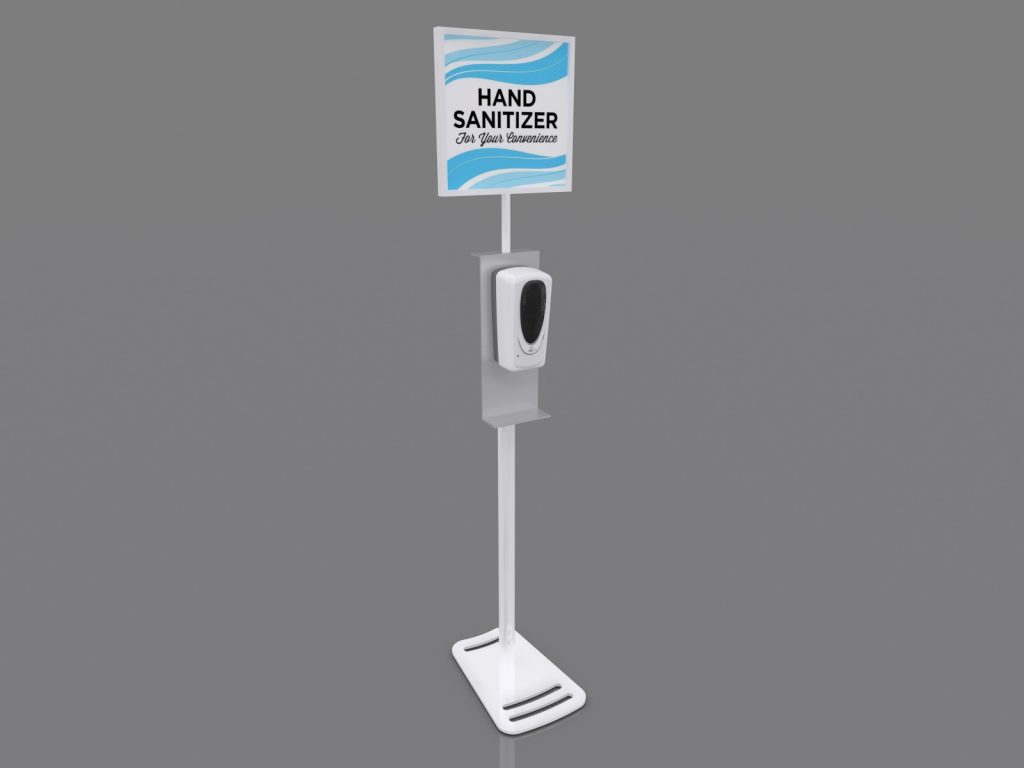
6. MOD-8036 | Flat Safety Dividers. Frankly, most safety dividers are ugly and fragile. Not the MOD-8036. The silver anodized frame along with etching and/or vinyl graphics elevates a simple divider into a tasteful barrier.
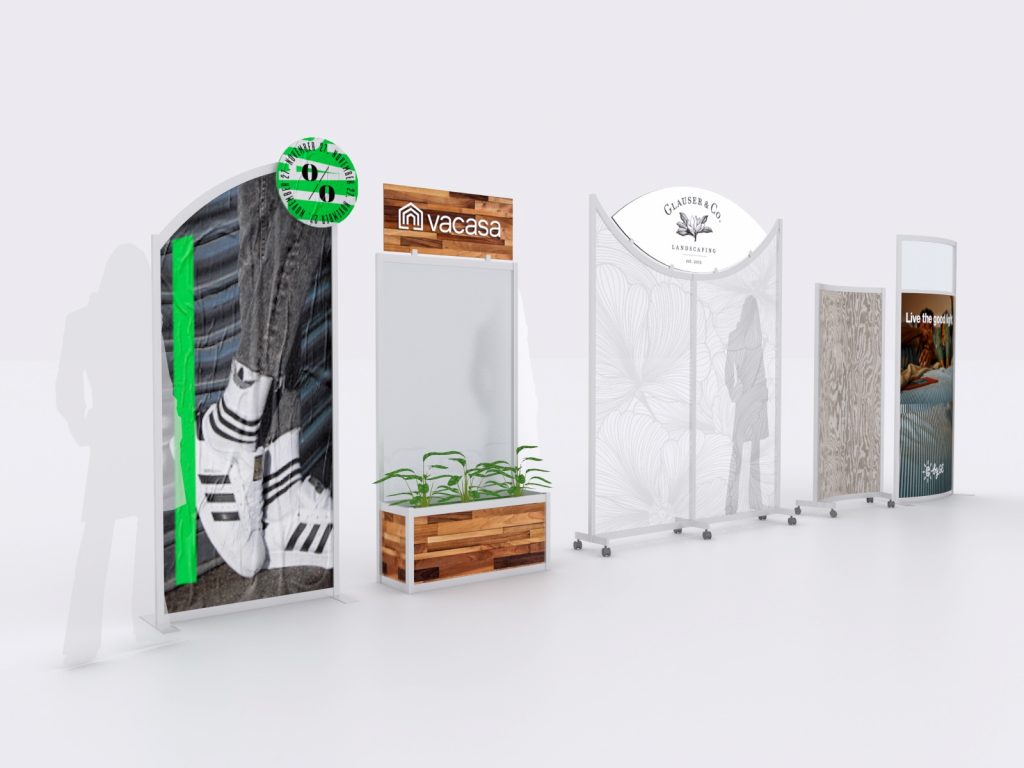
Buy or Rent a Modern Trade Show Booth with Classic Exhibits
Classic Exhibits has been designing and building trade show solutions since 1993. We’ve worked hard to win many design awards and love to challenge our team with new and innovative designs. We take great pride in keeping our team, customers, and community safe and look forward to helping you design a modern trade show booth that not only prioritizes safety but helps you exceed your trade show goals.


